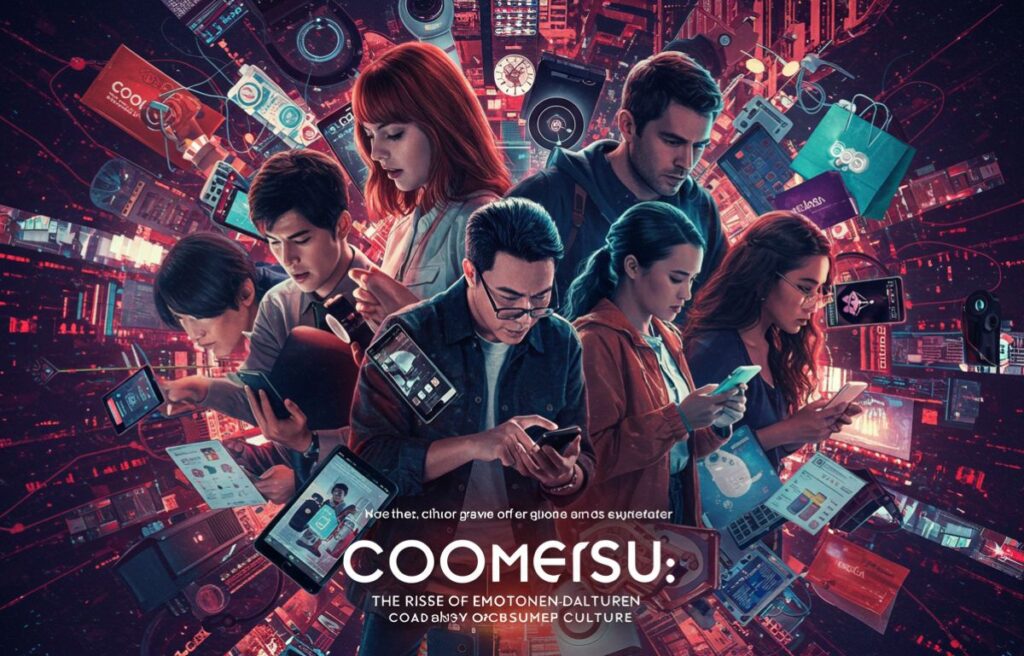The term Coomersu has recently emerged in online discussions, blending internet slang and social commentary into a single, provocative concept. Rooted in the fusion of “coom” (a meme term describing compulsive desire) and “consumer,” Coomersu refers to individuals driven by emotional or impulsive urges to acquire or obsess over content, merchandise, or lifestyles—often tied to fictional characters, fandoms, or hyperconsumerism. Though the word originated in internet subcultures, its implications are spreading fast, offering insights into the psychology of modern consumer behavior.
What Is Coomersu?
Coomersu describes a person whose identity and satisfaction are deeply intertwined with their consumption habits, particularly in fan-based or fantasy-driven markets. Unlike traditional consumers who buy out of necessity or practicality, Coomersu individuals often consume as a form of escapism, emotional expression, or obsession.
This mindset is typically evident in niche online communities, where followers of a character, game, anime, or show purchase merchandise, digital content, and collectibles not just for use, but to feel emotionally closer to the subject of their obsession.
The Origin of Coomersu
The word Coomersu is an amalgamation of internet meme culture. “Coom” refers to an exaggerated portrayal of someone overwhelmed by lust or compulsion—commonly used satirically online. “Consumer” is self-explanatory. Together, Coomersu captures a humorous yet critical perspective of modern hyper-fandom, where desire and consumption blend.
While the term may seem humorous or even crude, it highlights a genuine phenomenon: the growing emotional dependency on fictional content and media products as substitutes for deeper human needs like connection, identity, and self-worth.
Coomersu in Fandom and Pop Culture
Fandom culture is a breeding ground for Coomersu behavior. From anime figures and limited-edition posters to digital NFTs and in-game skins, fans often form intense emotional bonds with fictional characters or universes.
The Coomersu phenomenon can be seen in:
-
Fans who spend thousands on character merchandise.
-
Individuals who feel emotionally attached to digital personas.
-
Communities that form identities around shared fictional interests.
In this context, Coomersu becomes more than a label—it describes a lifestyle driven by emotional gratification through consumption.
Psychological Roots of the Coomersu Mentality
Several psychological principles explain why Coomersu culture is thriving:
1. Escapism and Fantasy Fulfillment
Many people use fiction to escape real-world stress or dissatisfaction. Coomersu tendencies emerge when individuals find more comfort in fictional engagement than in real-life relationships or experiences.
2. Identity Formation
For some, fictional worlds provide clearer structures for self-expression. The Coomersu might identify more with an anime character than with peers or family members, creating an identity around that character or world.
3. Emotional Reward Systems
The brain responds to novelty, beauty, and affection—even in fiction. When consuming related products or media, Coomersu individuals may feel genuine emotional highs similar to those from real relationships.
The Role of Marketing in Fueling Coomers Culture
Brands and marketers have tapped into Coomersu psychology with remarkable precision. Emotional marketing, limited-edition drops, exclusive fan events, and parasocial engagement (like VTubers or influencers who simulate personal relationships) are all strategies that keep the engaged—and spending.
This targeted approach makes fans feel seen, heard, and emotionally involved. However, it also blurs the line between emotional fulfillment and consumer manipulation.
Criticism and Controversy Around Coomers
While the term started as a meme, its growing use has sparked debate. Critics argue that it unfairly mocks people who find joy in fandom or emotional attachments to fiction. Others see it as a valid critique of modern capitalism’s ability to exploit emotional vulnerabilities.
There are two sides to this conversation:
-
Critics of Culture: Say it’s a symptom of emotional detachment, unhealthy parasocial relationships, and consumerist addiction.
-
Defenders of Fandoms: Claim that expressing oneself through media and merchandise is a valid, even therapeutic, form of identity.
The truth likely lies in the middle, suggesting the importance of balance and self-awareness in consumption.
Coomersu vs. Regular Consume Behavior
To distinguish Coomersu from ordinary consumption, consider the emotional intensity and identity stakes involved. A casual fan might buy a movie poster. A might spend hundreds on rare memorabilia, emotionally defend fictional characters, and derive significant meaning from their fictional engagement.
This level of investment can lead to:
-
Financial strain
-
Isolation from real-life relationships
-
Emotional dependency on fictional narratives
Understanding this distinction is key for those hoping to maintain a healthy relationship with media and merchandise.
Healthy Engagement and Avoiding the Coomers Trap
Not all intense fandom is harmful. Being a passionate fan can foster creativity, community, and happiness. However, avoiding extremes involves:
-
Setting financial and time limits on fandom engagement
-
Maintaining real-world relationships
-
Being aware of manipulative marketing tactics
-
Practicing mindfulness and self-reflection
By recognizing the line between passion and dependency, fans can enjoy their interests without becoming consumed by them.
Conclusion: Coomers in the Modern Age
Coomersu culture, while rooted in satire, reflects serious truths about modern emotional and consumer dynamics. As technology, entertainment, and marketing continue to blur the boundaries between reality and fiction, the risk of over-identifying with content becomes greater.
Whether seen as a humorous meme, cultural warning, or psychological insight, is a term that captures the emotional cost of unchecked consumerism in the digital age. The key takeaway is not to judge but to understand—and to strive for conscious consumption, where joy, identity, and emotional health coexist.







